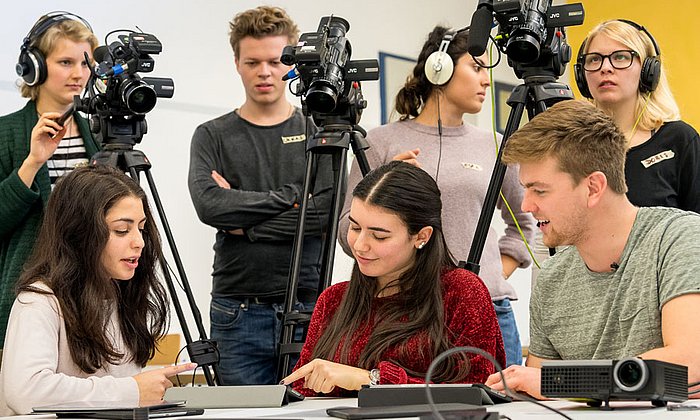PISA study surveys youth on global and intercultural topics
Well informed, less involved

How intensively do youth deal with global topics such as poverty, climate change and migration? Do they understand and appreciate other cultural points of view? Do they take action on behalf of collective well-being?
For the first time, the latest PISA study included an additional questionnaire on the topic of "Global Competence" in order to assess attitudes and interests among youth regarding these questions, and to ascertain how they assess their own knowledge and ability to change things. Approximately 3,800 15-year-old secondary school students in Germany responded in spring of 2018. Teachers received an additional questionnaire. The questions were analyzed in a total of 66 countries, including 27 members states of the Organisation for Economic Co-operation and Development (OECD), which coordinates the study.
Ability to act assessed as low
Youth in Germany feel somewhat better informed about topics of global importance than the average 15-year-old in the other OECD countries. German youth see their own ability to solve assignments relating to these topics as significantly higher than the same assessment by other youth of the same age. One example would be the task of explaining why some countries suffer more than others as a result of climate change – Germany had the highest level of all the participating OECD nations in this area. Respondents in Germany also indicated an above-average level of respect for people with different cultural backgrounds. The youth responded among other things to the question of whether children of immigrants should enjoy the same educational opportunities as other children. The awareness for intercultural communication is average in international comparison.
On the other hand students in Germany have a significantly lower level of interest in learning about other cultures than the average for OECD youth. They also assess their own ability to take action in the context of global topics as more limited, and their willingness to take action on behalf of global objectives is less developed. For example, the students were asked whether or not they assume that their own behavior can have an impact on people in other countries, and whether they are involved in environmental protection activities.
"Knowledge rarely put into action"
"It's important for students to come to terms with an increasingly connected world which is more and more characterized by cultural diversity," says Prof. Kristina Reiss of the Center for International Student Assessment (ZIB) at the Technical University of Munich (TUM) and head of the German section of the PISA study. "Youth in Germany are successful at that. But we have also determined that they rarely put their knowledge and attitudes into practice yet."
These results also hold true for other countries which are particularly similar to Germany in terms of their demography, cultural background and basic political conditions, such as Austria, France and the United Kingdom. "One possible interpretation is that a high level of understanding of the complexity of global problems is more likely to lead to the assessment that, as an individual, it is not possible to contribute much to the general solution," says Reiss.
Interest in other cultures higher among girls
Youth with immigrant backgrounds are more interested in learning about other cultures than those without immigrant backgrounds. The former group also feels that the atmosphere at German schools is more discriminatory that the latter group does. This is in contrast to the United Kingdom, for example, where this difference is not seen, in spite of a comparable proportion of students with immigrant backgrounds. Secondary school students from families with high socio-economic status in Germany have a comparatively more positive attitude towards equal rights for immigrants. This correlation is stronger than the average for other OECD nations. Germany also shows significantly higher levels of the difference in the (greater) interest of girls in other cultures compared to boys. The latter on the other hand are more confident when it comes to solving tasks relating to global topics, although both genders assess their own knowledge as equally high.
Only small numbers of teachers with intercultural training
Only ten percent of teachers surveyed in Germany indicated that they had training in intercultural communication, and only twelve percent have learned methods for taking cultural differences into account in class. These results are similar for university-track secondary schools (Gymnasien) and non-university-track schools. However, teachers at university-track secondary schools have a more positive attitude towards students with immigrant backgrounds.
"Teacher training should pay significantly more attention to intercultural skills," says Kristina Reiss. "And it should be more international. Study abroad is taken for granted in the majority of other subjects. There is no reason why future teachers should not benefit from experience abroad."
Weis, M., Reiss, K., Mang, J., Schiepe-Tiska, A., Diedrich, J., Roczen, N. & Jude, N. (2020). Global Competence in PISA 2018: Einstellungen von Fünfzehnjährigen in Deutschland zu globalen und interkulturellen Themen. In D. Holzberger & K. Reiss (Hrsg.), Wissenschaft macht Schule, Band 2. Münster: Waxmann. DOI: 10.31244/9783830993001
The main results of the seventh study "Programme for International Student Assessment (PISA)" on students' skills in reading, mathematics and science at the end of their mandatory schooling were published in December 2019.
The German part of the study is conducted by the Center for International Student Assessment (ZIB) at TUM on behalf of the German Standing Conference of the Ministers of Education and Cultural Affairs and the German Federal Ministry of Education and Research. In addition to TUM, participants in ZIB include the Leibniz Institute for Research and Information in Education (DIPF) and the Leibniz Institute for Science and Mathematics Education (IPN).
On methodology:
The comparisons in the report on the German part of the study refer primarily to the group of OECD nations, not to the other participating countries, where several factors make comparison more difficult. For example, in some of the countries only particular regions take part in the study.
Since culturally conditioned response patterns cannot be ruled out, comparisons between individual countries may be distorted.
For statistical reasons, comparisons between countries based on the extra questionnaire given to teachers is not possible.
Technical University of Munich
Corporate Communications Center
- Klaus Becker
- klaus.becker@tum.de
- presse@tum.de
- Teamwebsite
Contacts to this article:
Prof. Dr. Kristina Reiss
Center for International Student Assessment (ZIB) at the Technical University of Munich (TUM)
Tel: +49 89 289 25399
kristina.reiss@tum.de
![[Translate to en:] Male and female students are reading.](/fileadmin/_processed_/9/e/csm_191203_PISA-Studie_Lesekompetenz_iStock-499112607_monkeybusinessimages_12dad78501.jpg)




